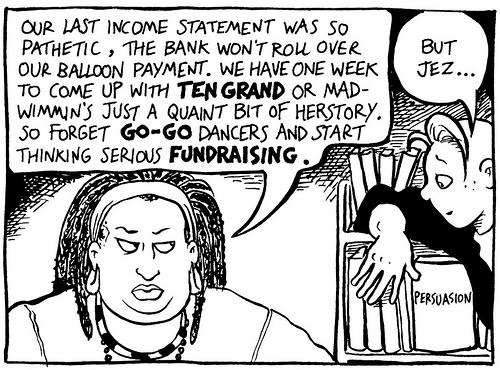Progressives Forced To Ask, Is Amazon Any Better Than Wal-mart?

For a long time, the corporate hierarchy was clear. Trader Joe’s was cooler than Whole Foods. Goodwill was cooler than JC Penney’s. Target was cooler than Kmart. Costco was cooler than Sam’s Club. And everything, literally everything, was cooler than Wal-mart.
Wal-mart embodies the worst of late 20th century Western-style capitalism: its ethos is one of sprawl, suburbs, and sexism, of union busting and blandly sinister patriarchal corporatization. Wal-mart is fluorescent aisle after fluorescent aisle of junk made in China and sold for cheap to customers who cannot afford to pay more because their jobs have been either outsourced to China or crushed under the huge, flat, sensibly clad feet of Wal-mart itself.
Amazon, though. Alison Bechdel lampooned it early on as an enemy she called “Medusa.com” in her comic strip Dykes To Watch Out For. It was, in fact, the online behemoth that drove Jez’s indie bookstore, Madwimmin, out of business:

But though some leftists and people in publishing have carped about the dangers of Amazon from the beginning, most people have been either neutral towards or supportive of Jeff Bezos’s grand online experiment. Its name is more sophisticated than Wal-mart’s. Its branding is better. It’s virtual, rather than a literal array of pockmarks on the face of America. It has started to produce high quality, cutting-edge television. And, for ages, seemingly, it’s been, despite its size, kind of an underdog. As recently as last year, journalists were writing novella-length investigations into whether and to what extent it was even profitable.
It was convenient, it was affordable, and lots of people who wouldn’t be caught dead shopping in a Supercenter were signing up for Prime.
Now, thanks to an article in the Times about its business structure that is as elaborately researched as it is grimly depressing, consumers are being forced to take a closer look at Amazon and ask themselves, “How do I feel about supporting a terrifying corporate hellscape?”
At Amazon, workers are encouraged to tear apart one another’s ideas in meetings, toil long and late (emails arrive past midnight, followed by text messages asking why they were not answered), and held to standards that the company boasts are “unreasonably high.” The internal phone directory instructs colleagues on how to send secret feedback to one another’s bosses. Employees say it is frequently used to sabotage others. (The tool offers sample texts, including this: “I felt concerned about his inflexibility and openly complaining about minor tasks.”) …
Google and Facebook motivate employees with gyms, meals and benefits, like cash handouts for new parents, “designed to take care of the whole you,” as Google puts it.
Amazon, though, offers no pretense that catering to employees is a priority. Compensation is considered competitive — successful midlevel managers can collect the equivalent of an extra salary from grants of a stock that has increased more than tenfold since 2008. But workers are expected to embrace “frugality” (No. 9), from the bare-bones desks to the cellphones and travel expenses that they often pay themselves. (No daily free food buffets or regular snack supplies, either.) The focus is on relentless striving to please customers, or “customer obsession” (No. 1), with words like “mission” used to describe lightning-quick delivery of Cocoa Krispies or selfie sticks.
Sounds rough, sure. But how do they treat female employees who have been diagnosed with cancer or who recently miscarried?
A woman who had thyroid cancer was given a low performance rating after she returned from treatment. She says her manager explained that while she was out, her peers were accomplishing a great deal. Another employee who miscarried twins left for a business trip the day after she had surgery. “I’m sorry, the work is still going to need to get done,” she said her boss told her. “From where you are in life, trying to start a family, I don’t know if this is the right place for you.”
A woman who had breast cancer was told that she was put on a “performance improvement plan” — Amazon code for “you’re in danger of being fired” — because “difficulties” in her “personal life” had interfered with fulfilling her work goals. Their accounts echoed others from workers who had suffered health crises and felt they had also been judged harshly instead of being given time to recover.
A former human resources executive said she was required to put a woman who had recently returned after undergoing serious surgery, and another who had just had a stillborn child, on performance improvement plans, accounts that were corroborated by a co-worker still at Amazon. “What kind of company do we want to be?” the executive recalled asking her bosses.
The response on Twitter has been scathing. No one, really, has stepped forward to defend Amazon. Not even Bezos himself.
Jeff Bezos said anyone who worked at a company like the one portrayed in the Times’ story would be “crazy to stay:” http://t.co/B2CeBynaEx
— Forbes (@Forbes) August 17, 2015
Maybe. Or suffering from Stockholm Syndrome, or just desperate to keep a job during an economic downturn.
Further, as per Forbes:
Bezos, who declined to be interviewed for the Times’ piece through an Amazon spokesperson, does not go into specific detail of what has and has not happened at his company in the letter, but called the management practices surrounding the health and family issues “shockingly callous.” He encouraged employees to contact the human resources department or his own personal email if they’ve heard of such practices and emphasized that Amazon has no tolerance for “such a lack of empathy.”
Excellent two-pronged response, Jeff: 1) denying that there’s a problem, and 2) telling individual workers, who are already being penalized for falling out of step, to bring more attention to themselves by going to HR.
The problems as documented by the Times seem to be the results of a top-down policy. The solutions need to come from the top down, too. Or else consumers at large are going to realize, if we haven’t already, that Amazon is just a 21st century Wal-mart with better hair.
Support The Billfold
The Billfold continues to exist thanks to support from our readers. Help us continue to do our work by making a monthly pledge on Patreon or a one-time-only contribution through PayPal.
Comments